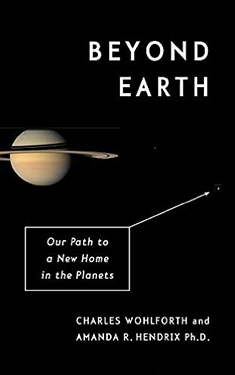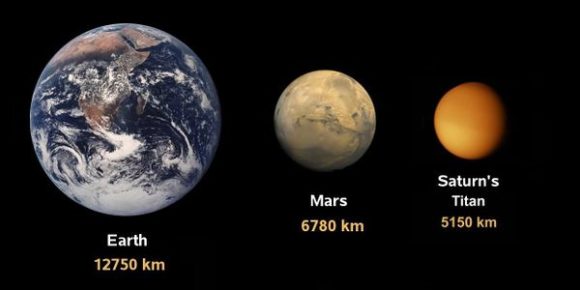 In Beyond Earth: Our Path to a New Home in the Planets, Charles Wohlforth and Amanda R. Hendrix propose colonizing Titan, the largest moon of Saturn, and the second largest moon in the solar system. They reject constructing colonies on Mars and the Moon, claiming Titan offers the most resources for creating a permanent human settlement.
In Beyond Earth: Our Path to a New Home in the Planets, Charles Wohlforth and Amanda R. Hendrix propose colonizing Titan, the largest moon of Saturn, and the second largest moon in the solar system. They reject constructing colonies on Mars and the Moon, claiming Titan offers the most resources for creating a permanent human settlement.
Even though I don’t buy their premise, Wohlforth and Hendrix have written a book that nicely sums up the current knowledge on human space travel. What’s damning and depressing is their long litany of obstacles we face living in space. Over the years I’ve read news reports about the various dangerous health effects of space travel, but reading them all in one place makes me wonder if science fiction is completely wrong about the future of humans in space.
Oddly enough, near the beginning of their story, Wohlforth and Hendrix report books on space colonization are never taken seriously by professionals in the space industry. Evidently, such wild ideas are a danger to the careers of real space scientists. Wohlforth and Hendrix say books about colonizing space give amateur space enthusiasts hope, but those folks lie on the fringe, closer to science fiction fans than scientists. I’m a space enthusiast and a science fiction fan, so Beyond Earth is my kind of book, but I couldn’t help taking this news as a slight.
Between what W&H report on the dangers of space travel and the politics of the space industry, it feels like they have damned their own hopes in Beyond Earth to oblivion. The upside of their story is the reporting on private space programs, like SpaceX. That news is very encouraging, if not inspirational.
However, I have a problem with colonizing Titan. It’s a distance too far. Earth’s moon is three days away, Mars is six months. Titan is seven years! Wohlforth and Hendrix do make a case for faster space travel, but even if Titan was only hours away, it’s still too far, too cold, too strange, and, too inhuman. Science fiction hasn’t prepared us for living on Titan like it has for the Moon and Mars.
For the past fifty years, I’ve heard many arguments for colonizing the Moon or Mars. The whites and the reds, you might say. We know those worlds well enough to feel they aren’t so strange. They are barren, not fit for man nor beast, but we have already psychologically imagined ourselves there nonetheless. Titan is too far in distance and conceptualization.
 From all the medical studies that Wohlforth and Hendrix review, I’m not sure humans are meant to live in space at all. Maybe our science fictional dreams are flat-out impractical. No matter what hurdle Wohlforth and Hendrix report, they don’t get discouraged, always coming up with hopeful workarounds. I was discouraged. Is it time for science fiction to start speculating about futures where humans never leave Earth? When do we give up? I’m not ready yet, but I do believe we need to start contemplating the possibility.
From all the medical studies that Wohlforth and Hendrix review, I’m not sure humans are meant to live in space at all. Maybe our science fictional dreams are flat-out impractical. No matter what hurdle Wohlforth and Hendrix report, they don’t get discouraged, always coming up with hopeful workarounds. I was discouraged. Is it time for science fiction to start speculating about futures where humans never leave Earth? When do we give up? I’m not ready yet, but I do believe we need to start contemplating the possibility.
After reading Beyond Earth I believe we should put all our manned space efforts into building bases on the Moon. We need to test humans living in low gravity for years. We’ve already discovered that living in microgravity for longer than six months causes permanent bodily damage. We’re learning that living in space will eventually cause permanent brain damage from galactic radiation. The safe time limit might be just 1-2 years, and there’s no practical shielding for spacecraft.
 We should send robots to the Moon to construct an underground city safe from radiation. Those robots need to mine all the resources on the Moon that’s possible, so we fly the least weight from Earth. Robots should then fill the underground city with plants and test animals. When the robots have created a sustaining livable habitat, then send humans to stay for several years. Only then will we know what happens to our bodies living in less than 1 G. After we’ve gained knowledge from such an experiment, then we’ll know if we should travel greater distances. If we survive living on the Moon, then go to Mars or even Titan.
We should send robots to the Moon to construct an underground city safe from radiation. Those robots need to mine all the resources on the Moon that’s possible, so we fly the least weight from Earth. Robots should then fill the underground city with plants and test animals. When the robots have created a sustaining livable habitat, then send humans to stay for several years. Only then will we know what happens to our bodies living in less than 1 G. After we’ve gained knowledge from such an experiment, then we’ll know if we should travel greater distances. If we survive living on the Moon, then go to Mars or even Titan.
Wohlforth and Hendrix make a great case that we’re intentionally ignoring medical evidence. That we don’t want to believe that space is ultimately unhealthy. That our gung-ho nature makes us believe we can either use technology to overcome obstacles, or we can push our bodies further than the evidence suggests. I wonder if such optimism is just a way of fooling ourselves because we don’t want our science fictional dreams to come to an end.
I don’t know about you, but Titan is too far for me. What if Mars and the Moon are too far too? As Beyond Earth progresses it becomes more like science fiction than science fact. Anyone who writes science fiction might want to mine it for ideas. On the other hand, this book’s optimism makes me question the optimism of science fiction. Should we expect the future to give us everything we imagine?
Recommended Reading